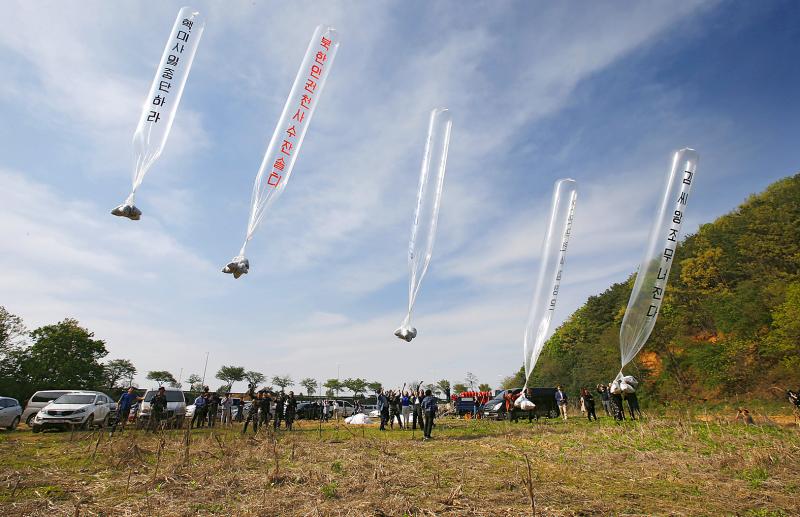South Korea yesterday said that it planned to push new laws to ban activists from flying anti-Pyongyang leaflets over the border after North Korea threatened to end an inter-Korean military agreement reached in 2018 to reduce tensions if Seoul fails to prevent the protests.
The South’s desperate attempt to keep alive a faltering diplomacy will almost certainly trigger debates over freedom of speech in one of Asia’s most vibrant democracies.
Sending balloons across the border has been a common activist tactic for years, but North Korea considers it an attack on its government.

Photo: EPA-EFE
Defectors and other activists in the past few weeks have used balloons to fly leaflets criticizing authoritarian North Korean leader Kim Jong-un over his nuclear ambitions and dismal human rights record.
While Seoul has sometimes sent police to block such activities during times of high tension, it had resisted the North’s calls to fully ban them, saying that the activists were exercising their freedoms.
The shift followed remarks earlier in the morning from Kim’s sister Kim Yo-jong, who threatened to end the military agreement and said that the North could permanently shut a liaison office and an inter-Korean factory park that have been major symbols of reconciliation.
In her statement released through state media, Kim Yo-jong called the defectors involved in the balloon launches “human scum” and “mongrel dogs” who betrayed their homeland, and said that it was “time to bring their owners to account,” referring to the government in Seoul.
South Korean Ministry of Unification spokesman Yoh Sang-key said that the balloon campaigns were threatening the safety of residents living in the border area and that his government would push for legal changes to “fundamentally resolve tension-creating activities.”
Asked whether the ministry would specifically express regret over the North’s threat to abandon inter-Korean agreements, Yoh said: “We will substitute our evaluation [of the North Korean] statement with the announcement of the government position [on the issue].”
South Korea’s ruling liberal party and its satellite party have 180 seats in the 300-seat South Korean National Assembly after triumphing in elections in April, giving it a solid majority to win approval for the proposal in the legislature.

Yemen’s separatist leader has vowed to keep working for an independent state in the country’s south, in his first social media post since he disappeared earlier this month after his group briefly seized swathes of territory. Aidarous al-Zubaidi’s United Arab Emirates (UAE)-backed Southern Transitional Council (STC) forces last month captured two Yemeni provinces in an offensive that was rolled back by Saudi strikes and Riyadh’s allied forces on the ground. Al-Zubaidi then disappeared after he failed to board a flight to Riyadh for talks earlier this month, with Saudi Arabia accusing him of fleeing to Abu Dhabi, while supporters insisted he was

The Chinese Embassy in Manila yesterday said it has filed a diplomatic protest against a Philippine Coast Guard spokesman over a social media post that included cartoonish images of Chinese President Xi Jinping (習近平). Philippine Coast Guard spokesman Jay Tarriela and an embassy official had been trading barbs since last week over issues concerning the disputed South China Sea. The crucial waterway, which Beijing claims historic rights to despite an international ruling that its assertion has no legal basis, has been the site of repeated clashes between Chinese and Philippine vessels. Tarriela’s Facebook post on Wednesday included a photo of him giving a

‘MOBILIZED’: While protesters countered ICE agents, Minnesota Governor Tim Walz activated the state’s National Guard to ‘support the rights of Minnesotans’ to assemble Hundreds of counterprotesters drowned out a far-right activist’s attempt to hold a small rally in support of US President Donald Trump’s latest immigration crackdown in Minneapolis, Minnesota, on Saturday, as the governor’s office announced that National Guard troops were mobilized and ready to assist law enforcement, although not yet deployed to city streets. There have been protests every day since the US Department of Homeland Security (DHS) ramped up immigration enforcement in the Twin Cities of Minneapolis and Saint Paul by bringing in more than 2,000 federal officers. Conservative influencer Jake Lang organized an anti-Islam, anti-Somali and pro-US Immigration and Customs Enforcement

NASA on Saturday rolled out its towering Space Launch System (SLS) rocket and Orion spacecraft as it began preparations for its first crewed mission to the Moon in more than 50 years. The maneuver, which takes up to 12 hours, would allow the US space agency to begin a string of tests for the Artemis 2 mission, which could blast off as early as Feb. 6. The immense orange and white SLS rocket, and the Orion vessel were slowly wheeled out of the Vehicle Assembly Building at the Kennedy Space Center in Florida, and painstakingly moved 6.5km to Launch Pad 39B. If the